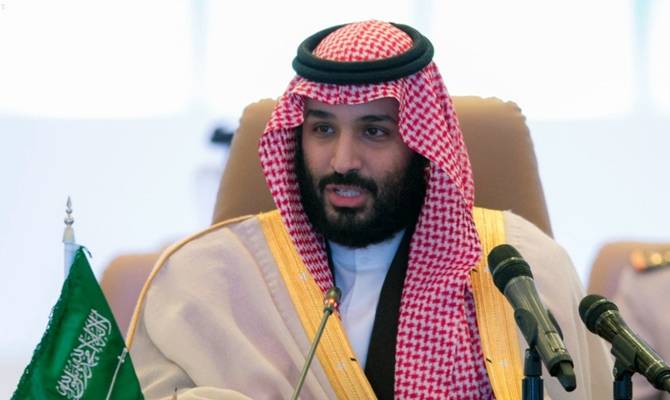What does the return of MBS mean, and will it have repercussions for Israel?
By JNS
Saudi Arabia’s Crown Prince Mohammed bin Salman (MBS) toured the Middle East this week—stopping in Egypt, Jordan and Turkey—marking his return to the international stage after becoming a pariah following the murder of journalist and Saudi government critic Jamal Khashoggi. MBS’s top-level meetings come ahead of a mid-July visit to the region by U.S. President Joe Biden, which will include the Saudi kingdom.
What does the return of MBS mean, and will it have repercussions for Israel?
“A victory tour is a good way of putting it,” Joshua Teitelbaum, a professor in the Department of Middle Eastern Studies at Bar-Ilan University in Ramat Gan, told JNS. “He is returning to the stage as a world leader. … It’s an ‘I am here’ tour. ‘I’m back in the game and I’ve put the Jamal Kashoggi thing behind me.’ ”
Khashoggi was a reporter for The Washington Post who was killed and dismembered by a hit squad at the Saudi consulate in Istanbul on Oct. 2, 2018.
Eytan Gilboa, a senior fellow at the Jerusalem Institute for Strategy and Security (JISS), agreed, telling JNS: “The visit itself is the message. MBS wants legitimacy.”
MBS’s reconciliation with Turkey is the most dramatic manifestation of this. Turkish President Recep Tayyip Erdoğan blamed the “highest levels” of the Saudi government for the murder and led the international campaign against Riyadh.
But as MBS and Erdoğan embraced in Ankara on Wednesday, there was no sign that a feud had ever existed. In a joint statement, the two countries proclaimed a “new era of cooperation” and promised to work together in the fields of defense, energy and other regional issues.
‘This Visit is Very Critical for Biden’
Critics denounced Erdoğan for abandoning justice for Kashoggi in order to restore Turkey’s currency and boost his reelection chances. Reportedly under discussion during Erdoğan’s meeting with MBS was a currency swap—a method that Turkey has favored to shore up its foreign reserves. The Turkish lira has fallen 20% this year and 44% last year. Its collapse is cited as the reason why Erdoğan’s party lost major cities like Istanbul and Ankara in the 2019 local elections.
Financial pressures are also behind Biden’s about-face on Saudi Arabia, according to observers. When Biden entered office, he promised to make the Saudis “pay the price” and turn them into a “pariah” over the Kashoggi killing. But the president’s tone has changed in recent months as U.S. gas prices rose to record highs. It is generally agreed, though denied by the White House, that Biden’s visit to Saudi Arabia is motivated by his need to convince the Saudis to increase oil production.
“Biden completely reversed his policy towards Mohammed bin Salman from isolation and confrontation to cooperation. There is one reason for that, and that is the war in Ukraine, the steep rise in gasoline prices and the need for Saudi Arabia to increase production,” said Gilboa. “MBS said, ‘Oh, you want an increase in production, then you have to do certain things.’ And this is exactly what Biden is doing.”
Oil prices have “absolutely” sped up MBS’s return to the world stage, said Teitelbaum. “While the United States may no longer be dependent on the Saudis for oil, it is still dependent on the Saudis for the price of oil.” He noted that U.S. production alone can’t dictate international prices.
American energy needs necessitate Biden making an awkward reversal, and that is where Israel comes in, noted Teitelbaum. Biden is using a possible Israeli-Saudi rapprochement as justification for his meeting. “If you look at Biden’s language as he climbs down from his tree towards Mohammed bin Salman, he is basically saying, ‘I’m still going to talk about human rights, but if I can advance Israeli-Arab relations, I’ll meet with anybody,’ ” he stated.
‘It Could Happen Now’
Gilboa agreed with that assessment and added that the message—while useful to Biden politically—could lead to concrete and beneficial results for Israel. He said that Israel should expect some gesture from Saudi Arabia, such as letting all Israeli passenger flights cross its airspace. (Currently, only Israeli flights to the United Arab Emirates and Bahrain can do so.)
Teitelbaum speculated that the Saudis and Israelis might open “interest sections” in embassies of third countries. An “interest section” is a way for a country to offer consular services in a state with which it doesn’t have diplomatic relations. America, for example, uses the Swiss embassy in Iran.
Gilboa said the idea had been broached. “I would consider that an even greater step towards normalization. Israel wants it to happen. I’m not so sure that the Saudis are yet ready for that. But it could be that it will happen now,” he stated.
“This visit is very critical for Biden, and in fact, I think he can’t lose,” said Gilboa. “This visit is very well-organized. Every step is well-known in advance. Every step has a meaning. And I imagine that even the joint statements have already been written.”
Do You Love Israel? Make a Donation to Show Your Support!
Donate to vital charities that protect Israelis and help inspire millions around the world to support Israel too!
Now more than ever, Israel needs your help to fight and win the war -- and also the battle of public opinion.
Anti-Israel bias and boycotts are out of control. Israel's enemies effectively use social media to incite brutal terror against innocent Israeli civilians. Please help us fight back!




